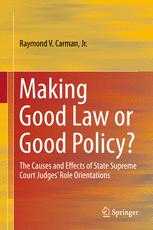

Most ebook files are in PDF format, so you can easily read them using various software such as Foxit Reader or directly on the Google Chrome browser.
Some ebook files are released by publishers in other formats such as .awz, .mobi, .epub, .fb2, etc. You may need to install specific software to read these formats on mobile/PC, such as Calibre.
Please read the tutorial at this link. https://ebooknice.com/page/post?id=faq
We offer FREE conversion to the popular formats you request; however, this may take some time. Therefore, right after payment, please email us, and we will try to provide the service as quickly as possible.
For some exceptional file formats or broken links (if any), please refrain from opening any disputes. Instead, email us first, and we will try to assist within a maximum of 6 hours.
EbookNice Team

Status:
Available4.6
30 reviewsThis book uses role theory to analyze the judicial decisions made by state supreme court judges. Grounded in the fields of anthropology, business management, psychology, and sociology, role theory holds that, for each position an individual occupies in society, he or she creates a role orientation, or a belief about the limits of proper behavior. Judicial role orientation is conceptualized as the stimuli that a judge feels can legitimately be allowed to influence his or her decision-making and, in the case of conflict among influences, what priorities to assign to different decisional criteria. This role orientation is generally seen as existing on a spectrum ranging from activist to restraintist. Using multi-faceted data collection and empirical testing, this book discusses the variation in judges’ role orientations, the role that personal institutional structure and judges' backgrounds play in determining judicial orientations, and the degree to which judges’ orientations affect their decision-making. The first study to provide cross-institutional research on state supreme court judges, this book expands and advances the literature on judicial role orientation. As such, this book will be of interest to graduate students and researchers studying political science, public policy, law, and the courts.